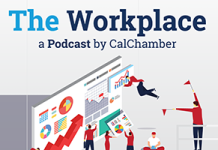Much has happened over the weekend on a national scale and for California, there is rising concern among business owners and employers due to the rapidly changing issue of COVID-19. In this episode of The Workplace podcast, CalChamber Executive Vice President and General Counsel Erika Frank and employment law expert Jennifer Shaw discuss working remotely, the resources available for employees and Governor Gavin Newsom’s guidance on the state’s aging workforce.
Working Remotely
Employers should look at every employee position and decide what tasks to give the worker at home, Shaw explains. For some employers, this may be getting people set up remotely and ensuring they have what they need to work at home in case the office has to close.
“What I want to tell employers is that if people are working from home… it’s business as usual. They are just doing it from home,” she tells Frank.
From an employment law perspective, Shaw says, it is “calmly and rationally going through step by step… what are we going to do, what are my options [and] what can I afford to do…?”
Resources Available
The Labor Commissioner announced employees can use California Paid Sick Leave if they need to be home with their children because of school closures, Shaw reminds listeners.
“This is a really important point to emphasize because if you read the sick leave law, hanging out with your kids because [their school is] closed isn’t one of the permissible uses under the sick leave law,” Frank says.
This is why it’s really important to utilize the FAQs and information posted by different agencies, as mentioned in last week’s podcast. The California Chamber of Commerce HRWatchdog blog is a great resource too, Frank says.
Additionally, the Employment Development Department is allowing people to file for unemployment without having to go through a waiting period. There also is potential federal legislation, and a relief act that has passed the U.S House of Representatives, H.R. 6201: Families First Coronavirus Response Act, Shaw says.
Shaw’s advice is to follow the CalChamber coronavirus resource web page and a handful of other organizations to not get paralyzed from indecision because of information overload.
California’s Aging Workforce
On Sunday, March 15, Governor Newsom issued a directive guidance on individuals 65 years or older to stay in isolation, Frank reminds listeners.
Currently, there is no mandate for employers to follow the Governor’s recommendation, but California does have an aging workforce, which means a lot of employees are 65 or older.
The CalChamber Labor Law Helpline has been receiving a lot of questions about employers wondering what to do with this order and if they are allowed to send employees who are 65 years or older home, Frank explains.
The best approach, Shaw says, is if any of your employees, whether they are 21 years old or 81, are feeling vulnerable, they should go home. It doesn’t matter the age of the individual; tell your employees to take care of themselves and stay home, Frank adds.
Frank reminds listeners to just “take a deep breath and pause… everybody is in the same boat…This is a time for everybody to rise together and think a little bit outside the box and be compassionate to everyone.”

